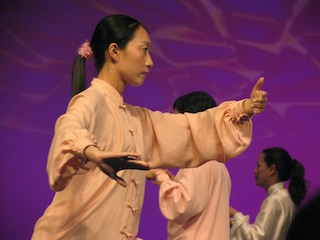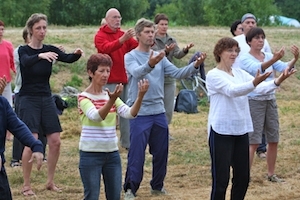
The title of a “teacher” or even a “master” or a “grandmaster” is not protected. Anyone can call him/herself “Qigong Master” or “Tai Chi Master” and open a school. So how to sift out the good ones?
It is important to choose your teacher wisely. You should avoid hopping around from teacher to teacher especially in the beginning of your Qigong or Tai Chi way. Focus on one style or one approach for the first years and deepen your skills. On this solid basis, you can look beyond your own system and try other teachers and styles. Meetings and festivals provide good opportunities to exchange experiences with other practitioners and to get an overview.
For some years now, you can find cross-style associations or national umbrella organisations which have developed quality standards, which are mandatory for their members to observe. If a teacher has a teaching license of one of these associations, this is a good sign – especially if the organisation encourages their members to educate themselves further by taking part in workshops and seminars. – With that said, there are also good teachers who are not a member of an organisation.
When it comes to the point to choose your teacher, rely on your common sense. Go to some trial lessons or taster workshops in different schools and gather some first-hand experiences before you decide.
Tips – Prepare your trial lesson
Tips:
The teacher should have practiced him/herself for many years
Qigong and Tai Chi base on body skills that need to be developed over a long period of time. Intensive training can enhance the results, but there are some changes, e.g. in the body-mind-coordination that need to sink in. The teacher must be far more experienced than the students to correct them in a helpful way. Try to picture a person that has played the piano for three years and now offers piano lessons to others. – It would not work well.
Avoid long-time contracts in the beginning!
Even if you might get a positive feeling after only a few hours of Tai Chi or Qigong, it will take some weeks or months to finally decide whether the teacher, his/her way of teaching, the overall orientation of the school and the interaction with your fellow students feels right for you in the long run.
Be sceptical if a teacher claims to teach “real” Tai Chi or “authentic” Qigong.
As with many things in life, one tends to strongly defend what one knows and loves best. To express the feeling that one does the real, authentic thing – in comparison to others – is only human, but it is certainly not the truth. Tai Chi and Qigong have a long history leading back into the mists of the past. There is no real or authentic Qigong somewhere which could have been found or handed down the generations like a jewel.
Be careful if the teacher expresses a claim to sole representation!
If a teacher obliges his/her students never to see another teacher, never go to exchange meetings with other schools and the like you should be careful. Even if the motives for this obligation are presented in a coherent argument (no mixing of styles, concentrating on one system, furthering of discipline and dedication), this move of the teacher is no sign for open-mindedness.
Be critical of great promises of healing and the wonders of Qi power!
Any mixing of Qigong or Tai Chi and life counselling, coaching or healing should be approached with caution! Qigong means “cultivation of life energy” and gongfu means “skills or abilities acquired by hard work”. Cultivation takes time and it is you who will have to do the hard work required to be able to stay relaxed in difficult circumstances or to change some life-long movement patterns that result in back pain or the like. There is no Chinese wonder waiting for you to find it!
High fixed costs in the beginning are dodgy!
Qigong and Tai Chi can only be learned in many years of dedicated practice. A good teacher would know this and be serious about it. Offers which promise that Tai Chi and Qigong can be learned quickly by buying a whole set of DVDs, by subscribing to an online programme or by a combination of (free) distance learning and (costly) courses do not indicate a responsible relationship between teacher and student. For Qigong and Tai Chi, you need some suitable shoes, comfortable clothes and motivation to learn. On top of that, your teacher must be paid and there are some workshops for advanced students that might be expensive. But yet, compared to other sports, Qigong and Tai Chi are quite cheap hobbies without having to compromise in terms of quality.
Also recommended reading:
Author: Taiji Forum
Images: Taiji Forum

